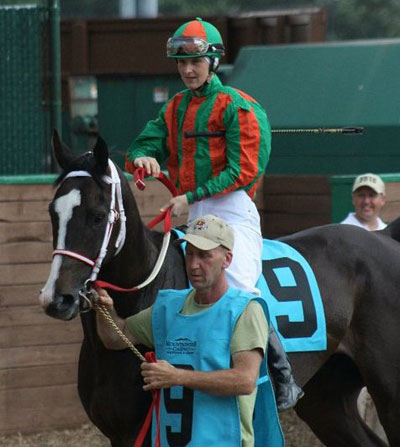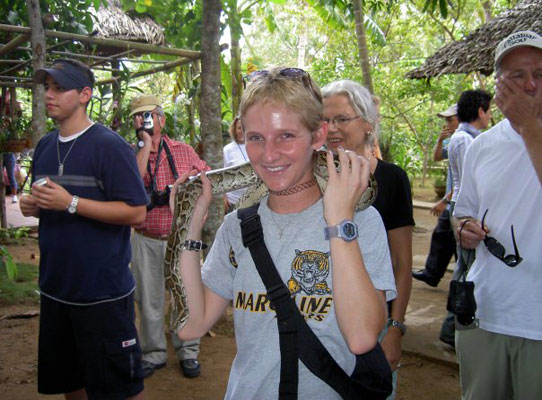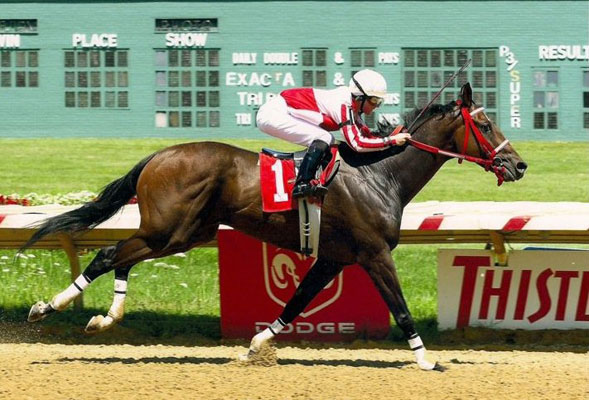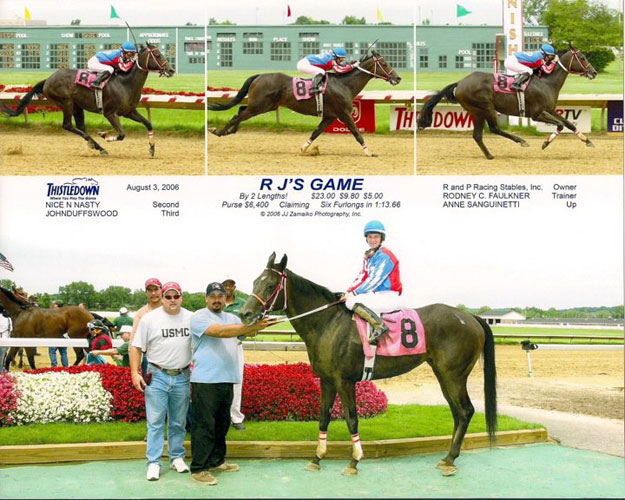





Annie Sanguinetti
I interviewed Jockey Annie Sanguinetti some years back for this website and since it has been awhile since our last chat I thought it would be nice to do a follow up interview to see what she been up to the past few years. I emailed her some questions and here is what she said to them:
FOTH: So what have you been up to since I last interviewed you?
AS: Going around in lots of circles:) I've ridden all over the country, as well as been to Dubai for the World Cup in 2008. I think at the time I spoke to you I was riding at Suffolk, and since then I have been to Portland Meadows, Thistledown, Mountaineer, River Downs, Delta Downs, Presque Isle, Pinnacle, Golden Gate, Turfway, Hollywood, Santa Anita, and Del Mar. I have only been race riding off and on since 2009 as I got injured and have had to take a lot of time off for that. I even went back to school for a little while thinking I'd get another degree and maybe leave the track, but I couldn't take being away from the horses and the races. Currently I am galloping in Southern California and riding a few races here and there. I plan to go back to full time race riding soon though.
FOTH: Now you have been riding for more than a few years now. Do you still have the same drive and passion that you had when you first started out?
AS: It's complicated, to be quite honest. I definitely have never lost the passion for winning races or the desire to ride the very best that I can and to continually improve as a rider. But I suppose what has changed is what I'm willing to give up to ride and what kind of terms I'm willing to ride on. When you first start, you'll ride anything vaguely resembling a horse. You'll jam your stuff in the trunk and hit the road for a new track at the drop of a hat. But now, for me anyway, I feel like I want to ride a bit more on my own terms. I don't want to be out there just to go around in a circle. I don't want to ride a race just to ride a race. If I'm out there, I want to have a shot. I have a lot of outside the track interests that I like to pursue, and living out of plastic tubs and perpetually sleeping on an air mattress gets old after awhile, so moving all the time has lost some of its appeal. All that said, I still love the game and the horses more than anything, and I don't think that will ever change.
FOTH: Have you ridden at any different tracks since I last spoke to you?
AS: Many many many:) They're all listed above, I think. Sometimes I forget one or two... the nice thing about the East Coast/ Midwest is that there are tons of tracks within driving distance of each other, so you get an opportunity to experience a lot of different places.
FOTH: Some tracks are now having female jockey challenges. Have you ever been involved in one and what are your thoughts on them?
AS: I've never been invited to one, but I'd love to participate in one. I think they're great, mostly as a marketing tool. Racing needs publicity and excitement, and for whatever reason, a lot of fans (especially younger ones and ones with children) seem to be interested in female riders.
FOTH: If you had the power, what are some things you would do to change horse racing to make it better?
AS: One thing I would like to change is in regards to claiming horses. I think that in order for a claim to be valid, the horse should have to cross the wire. This has recently been proposed, I think, in California. I guess as a person who got into the business as a horse lover, it just bothers me when people drop a horse in that they know is questionable to make it around so they can hopefully get it claimed and taken off their hands. In addition to the consequences for the individual horse, the other riders and horses are put at risk whenever a bad one is out there. This isn't much of a problem outside of the major tracks, as there isn't the same amount of claiming activity at the cheaper tracks (and most of the horses are running on the bottom already), but the larger ones are more in the spotlight, and thus I think the higher standards would be appropriate.
I also think the industry could use better marketing. Racing is very much an "under the radar" or some even say "dying" sport, and some of that is our own fault. We as an industry need to find new ways to market ourselves and make racing more prominent. I've introduced a lot of people to horse racing, and virtually all of them love it and return to the track on their own later. They always say to me, "I didn't even know there was a track in this area," or "I never knew anything about horse racing, but it's really a fun way to spend an afternoon." Also, though the purists perhaps don't like it much, I think there is a lot of potential for growth with online wagering. You can live-stream races from anywhere and bet on them, and I think that should be encouraged.
Perhaps most importantly, I think we need to streamline the process of thoroughbred retirement. Right now, it's a patchwork of charities (who do great work, by the way), but there isn't necessarily an easy way for trainers/ owners to find homes for their horses. The laws against slaughtering horses in the US have actually made things worse, I think, because the horses that were unfortunately getting slaughtered before still are, they're just being shipped (often in horrific conditions), to Mexico or Canada. It's really a black eye for the industry, in my opinion, and I'd love to see some sort of national organization that could ensure that any horse needing retirement could have it. Unfortunately, I don't know how we can go about accomplishing that, but I hope that we try. The cheap horses that make up the bulk of US racing are really wonderful animals, and they all deserve proper homes when they're done racing.
FOTH: I have always wanted to ask this, so you're my victim, ha ha, when you're out there riding can you hear the announcer calling the race?
AS: It depends. At certain tracks the announcer is louder than others, and it depends on where you are in the field also. If you're all alone in front, you can almost always hear them. Of course, you never hear them until about the 3/16 pole regardless, but sometimes you can hear them plain as day. I've occasionally even been able to hear individuals in the grandstand cheering (ie. friends/ grooms) or jeering.
FOTH: Do you feel you have a pretty good clock in your head by now as far as riding fractions go?
AS: Definitely. When I go to a new track though, I feel like I need a few races/ morning works to "recalibrate" my clock. I've never been able to work horses with a watch or anything, so I just have to do it all by feel. Each track is a little different, and some are easier than others for me to figure out. I think I tend to prefer regular dirt tracks to the synthetic ones, but as I've ridden more synthetic tracks, I've gotten to where I can figure them out too. I've always felt that the clock was one of my stronger points as a rider.
FOTH: How long would you like to ride for?
AS: As long as possible? I really have no idea... I guess as long as I still enjoy it and still have the competitive fire in me.
FOTH: Take me through what you do in a typical day?
AS: Right now, I get up at 3:30 or so (the track here opens at 4:30), go gallop until about 10, walk my dog, then relax for the rest of the day. It's quite a nice change of pace from what I've been doing for the past 3 or 4 years. When I was in the Midwest, I would gallop/ work horses from about 6 until 9 or 10, then rush home to walk the dog, then rush back to Thistledown for the races. Then, once I was through with my mounts there, about 3-5 days a week I would jump in the car and drive to either Mountaineer or Presque Isle (about an hour and 45 minutes away) to ride the night races at those tracks. Then I'd drive back home (I always lived near Thistledown) and do it all over again the next day. I think there was a period of time last summer where I rode at least one race for 22 days straight. I think that's why what was supposed to be a temporary "vacation" this winter (my Southern California galloping gig) has turned into almost a year. If I don't ride any races, I take an hour nap in the afternoon, and it feels fantastically decadent.
FOTH: What are some things you like to do when you’re away from the track?
AS: I love to read, knit, do crossword puzzles, listen to music, and goof around online. I also play the violin, though never as much as I wish I did, and walk my dog all over the place. I really like learning new things, and to that end I tend to read a lot of non-fiction, history, science, and math type books and articles. I like math and words a lot... so you could definitely say I am a huge nerd. I don't own a TV, and never have, so I'm totally clueless about pop culture. I do watch some DVDs on my computer, so there are a few shows and movies that I've actually seen, notable M*A*S*H and The West Wing.
FOTH: Do you have any short term or long term goals that you are still striving for?
AS: I would have to say yes, many, but I don't think I could really spell them out. I've never really been one to explicitly have goals besides just being the best I can/ working hard. I'd love to ride in (and win) a Breeder's Cup race, but I suppose every rider will tell you that. Strangely, the Kentucky Derby doesn't have the same appeal for me as does the Breeder's Cup. I think that's because the 1992 Breeder's Cup was actually the first time I ever saw a horse race, and it was what made me fall in love with racing. More important to me, I think, than any specific race is just earning respect as a rider and helping to further the acceptance of female riders in general. The first generation of female riders kicked the walls down and opened a lot of doors for us female riders that came after. I hope to be part of a generation of female riders that brings racing to a point where female riders are fully accepted and respected.
FOTH: Are there many other girl riders where you mostly ride at?
AS: At Thistledown/ Mountaineer/ Presque Isle we had quite a few, including Jane Magrell, Faith Schorr, Amanda Bower, Kirsten Swan, Rhonda Spieth, Annie Seabury, Arienne Cox, Chamisa Goodwin, Kelly Spanabel, and Brittany Arterburn (hope I didn't forget anyone!). Here in Southern California there are far fewer- Chantal Sutherland, Kayla Stra, and Joy Scott, but hopefully there will be more to come.
FOTH: Do you still feel you are improving as a rider?
AS: I hope so:) Ideally I would like to improve as a rider with every race of every day, though it's a bit difficult right now when I only ride a race or two a month. But once I go back to riding full time, I certainly plan to push myself to keep getting better all the time.
FOTH: Have you gotten to give a fellow jockey a 1st win ceremony and if you have, what did you get him or her with?
AS: Quite a few... what we get them with sort of depends on what we can find/ have handy.
FOTH: Do you think in some way shape or form you will always be involved in racing?
AS: Most likely. The track isn't something you can escape very easily...I think once it's in your blood, you're sort of stuck with it.
FOTH: I asked you this before, but I'll ask it again, if some young girl wants to become a jockey what advice would you give her?
AS: Finish school first, that's my number one. Being a jockey isn't the most stable or predictable of occupations, so I think it's important to have an insurance policy of sorts with an education.
Second, I'd say get a thick skin. Really thick. Be ready for it to be tough, and be able to pick yourself up off the ground (sometimes literally) and keep going. You get hired and fired all the time, you'll have differences of opinion with trainers, you'll have ups and downs, and you'll have to deal with difficult people. And you can't fall apart when things get rocky. I think it really helps to have some sort of support system (ie. family or friends) and interests outside of the track. If you do nothing but think about horses 24 hours a day every day, you can and probably will go nuts.
Thirdly, if you're not naturally light, make sure to be educated on nutrition and exercise so that you can maintain your weight in a healthy manner.
FOTH: What are some of the best and worst things about being a jockey?
AS: I think it would take me 20 pages to properly answer this one... but briefly, winning is certainly falls under the best category, as does getting to know and develop relationships with individual horses and getting to travel all around the country. The hours, lack of days off, and job insecurity are probably the top things I'd put in the worst category.
FOTH: Have you ever been recognized outside the racetrack?
AS: Once or twice, but I've mostly ridden at tracks that get most of their "crowd" from simulcasting, so most fans/ bettors likely haven't the slightest idea what I look like, which is just fine with me.
FOTH: Do you follow any other sports besides horse racing of course?
AS: Gymnastics. I was on my high school's team, and I still love the sport as much as racing.
FOTH: If asked, would you ever be in a reality show?
AS: Probably not. I don't like to watch TV, so I don't imagine I'd be very interested. I guess it might depend on how much they were paying (sad but true), and also I guess the premise of the show.
FOTH: Do you like riding on the dirt or grass more or either is fine with you?
AS: I much prefer the dirt, I think mostly because I have never ridden much at any tracks with good turf courses. I have mostly ridden on turf at places like Mountaineer and Suffolk where the courses are full of holes, dips, and often seem to have more dirt or weeds than grass. I also prefer dirt to synthetics, so I guess I'm sort of a traditionalist in that respect. For some odd reason, perhaps having to do with starting my bug in Portland, I like riding in the mud.
FOTH: To date, what has been your most favorite win?
AS: Probably still the Portland Mile in 2006 with Charlie's Pride, though I've won bigger races. I think that one was so special because both my parents were there and I have a strange affection for Portland Meadows. It meant a lot to me to have won their biggest race, and I also really loved the horse that I won on.
My other favorite win was in the Tah Dah Stakes for two year olds at River Downs. I won it with a first time starter for Tim Hamm that I had been working for quite awhile and I really thought she was a good one, so it was great to be proved right.
FOTH: To your knowledge have you ever brought in a 99-1 shot or more to the winner's circle?
AS: I think the longest shot I ever won with paid like $137, so not yet, but I think that would be kind of fun.
FOTH: I am out of questions...thumbs up for doing this 2nd interview any last words the floor is yours
AS: Thanks again Chris for the interview.
Back to our main
page